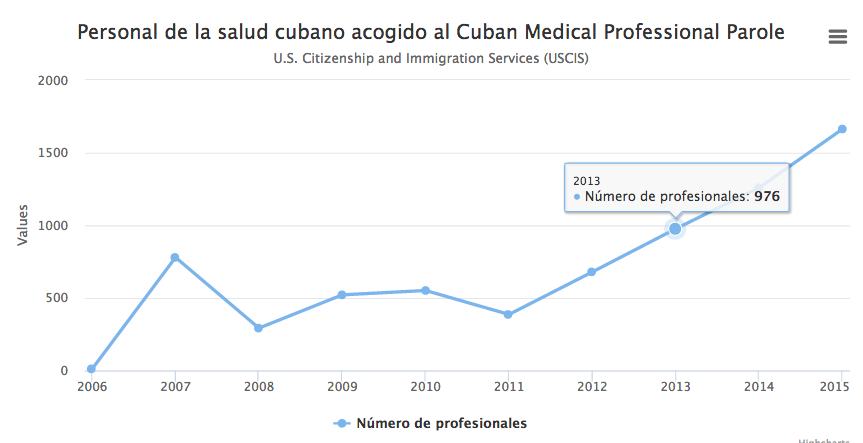
![]() 14ymedio, Miami, 3 February 2017 — The Ministry of Public Health released a statement Thursday in the official newspaper Granma to reiterate the willingness of Cuban authorities to take back health professionals who have “defected” from medical missions abroad.
14ymedio, Miami, 3 February 2017 — The Ministry of Public Health released a statement Thursday in the official newspaper Granma to reiterate the willingness of Cuban authorities to take back health professionals who have “defected” from medical missions abroad.
The announcement comes three weeks after the outgoing U.S. president, Barack Obama, eliminated the Cuban Medical Professional Parole (CMPP) program. This initiative, established during the Bush administration in 2006, facilitated the arrival in the United States of more than 8,000 Cuban doctors who were in other countries.
In 2014 the Cuban government, for the first time, offered health professionals who had defected, or tried to, a chance to rejoin the national system
“This kind of offering is not new,” said Yisel, a comprehensive general practitioner who left the island in 2015 via Ecuador. “The national health system has run out of workers because of the way they exploited us.” She currently resides in Miami.

In 2014 the Cuban government, for the first time, offered health professionals who had defected a chance to rejoin the national system. The following year, Granma published an extensive article where medical personnel were guaranteed a similar job location to what they had before leaving the country.
“Including those victims of the deceptive and vulgar practice of brain-drain,” said the Communist Party organ at that time.
“Nobody wants to return because what they offer is the same thing that we had,” explains the doctor.
Wages were raised in March 2014. Today, doctors in Cuba earn $60 a month. However, after the massive export of health services, professionals who remain on the island have to work double shifts in hospitals and working conditions have significantly worsened.
The Cuban government has been heavily criticized in international forums for the conditions under which it contracts for its medical staff
“The international medical collaboration that Cuba provides has as its principles volunteerism and the integral attention to the needs of the personnel inside and outside the country,” explains the official note. In addition, it adds that those who work abroad “are guaranteed a stipend, health care, food, accommodation and air and land transportation.”
The Cuban government has been heavily criticized in international forums for the conditions under which it signs agreements to contract for the employment of its medical staff. Most of the earnings, which the authorities acknowledged amounted to $8.2 billion in 2014, remain in the hands of the Cuban state.
According to the note published by the official press, there are three types of collaboration agreements: “one in which Cuba assumes the expenses, another where it shares them with the receiving country and the third in which they are paid.”
The note does not mention the twenty Cuban health professionals who are in immigration limbo in Colombia after escaping medical missions
The Ministry of Health explains that the resources obtained from the work of the doctors are used to support the national health system and offset the expenses of Cuban solidarity missions.
The note does not mention the twenty Cuban health professionals who are in immigration limbo in Colombia after escaping medical missions without knowing about the suspension of the CMPP.
Currently, more than 50,000 Cuban health workers are spread across 60 countries in missions mandated by the Government
Hundreds more awaited the processing of their refugee applications in other countries and await an American US visa in precarious conditions.
Currently, more than 50,000 Cuban health workers are spread across 60 countries in missions mandated by the Government.
